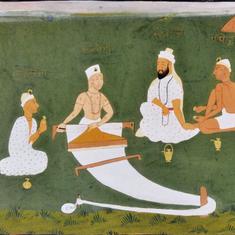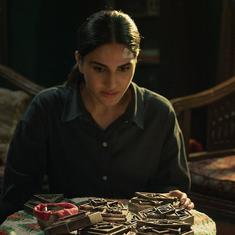There is nostalgia for a gentler time as well as bloody depictions of real-life historical events in this genre-crossing work by author and publishing stalwart Ashok Chopra. Part novel, part history book, the story of Memories of Fire follows the lives of five friends from their youth in an English-run boarding school, near the old British summer capital of Simla, through to old age in the violent 1980s of Indira Gandhi’s power struggles.
The fiction is interspersed with accounts of political unrest of the time, especially the rise of Sikh nationalism in the Punjab and its overpowering by Indira Gandhi’s troops at the Golden Temple in Amritsar in 1984. Adding to the patchwork are letters between the characters which allow a commentary on the current affairs of the period as well as musings on English and Indian literature.
These digressions are not without their drawbacks: the story-line and character development might have been stronger without the distractions. Nonetheless, there is plenty of erudition and enough thought-provoking ideas to carry the narrative.
The action starts at St Edward’s school where the friends make their first acquaintance under the tutelage of the inspirational Brother Walsh.
Here too, one of the five, Radhey Shyam, meets his future wife Aneeze, a young widow employed to teach Hindi. In time, their love blossoms, but there is a huge obstacle: Radhey Shyam is a Hindu and Aneeze a Muslim. They marry at the cost of having both sets of parents disown them.
The conflict between religion and happiness is a theme Chopra touches on several times. Another of the friends, Balbir Singh, renounces his Sikh faith and estranges his family. This move is prompted by an episode in Delhi where he has to cut his hair and hide his turban to avoid being lynched by a mob. But Balbir has also made a new life in London. His Chinese girlfriend, whom he eventually marries, tells him he can still be devout with short hair. As she recommends, Balbir chooses “to evolve with the changing times.”
Aligning religious differences isn’t the answer to India’s woes because, as Chopra shows, tolerance has existed among previous generations. Back in the small town of Rasoolpur, we see Sikh, Hindu and Muslim families living together quite contentedly. For example, Balbir’s father, Dr Waryam Singh, is the best friend of Seth Raja Ram, who is Radhey Shyam’s father. Together they take regular morning walks, visit each other’s temples and insist that their children attend prayer sessions in each other’s house. Yet once nationalism raises its ugly head, everything changes. As Chopra writes:
The people of Rasoolpur, as of all Punjab, watched helplessly as the raging fires of anger and hate gathered around them. Such sectarianism is all too easy to fall into because India herself is divided. Chopra laments a lack of national ethos, saying we talk and lecture and boast of India as a nation, but we are still governed by semi-feudal concepts of clans and families.
Without a shared value system, separatism will succeed. Hence the point of memories.
They are “the great healing factor, the balm that soothes many a wound,” says Chopra. While that particular point is debatable, it’s easier to agree with Chopra that memories encourage a state of reflection—with all its accompanying potential for analysis and solutions. Chopra’s purpose is for us to learn from his memories and not to allow the mistakes of the past to be repeated. Here he writes about the Punjab in particular but the notion can be applied to any isolationist policy:
“Let not the historians of today write for the generation of tomorrow that Punjab was an old mother with two sons. The elder one [the Hindus] left her while the younger one [the Sikhs] rejected her.”
Jane Wallace is a Hong Kong-born journalist and author living in London.

Memories Of Fire: A Novel, Ashok Chopra, Penguin Books.
This article first appeared on Asian Review of Books.










